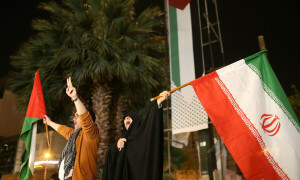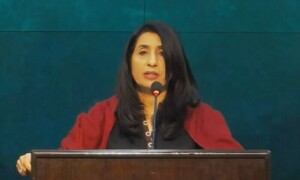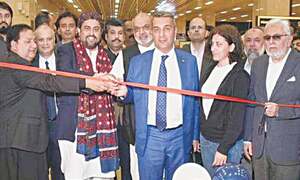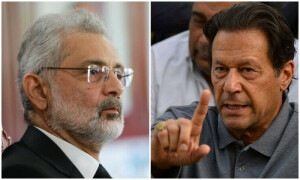 |
| TRIPOLI: Migrants rescued by Libyan coast guard after their boat sank pictured at a security centre between the coastal cities of Subrata and Zuwara on Friday.—AFP |
ZUWARA (Libya): Pakistani teenager Shefaz Hamza spent nine hours at sea clinging to the wreckage of a migrant boat that sank off Libya. By the time the coast guard arrived his mother and young sister were dead.
They were among at least 76 people to die when their boat went down on Thursday off the western Libyan port of Zuwara, Red Crescent spokesman Mohamad al-Misrati said.
Take a look: Boat packed with migrants sinks off Libya; up to 200 feared dead
Up to 198 other people were saved, including many of Arab and African origin, but dozens of others are still missing at sea, he said.
At a police station near Zuwara, Hamza sat on the ground next to his brother who was also rescued.
“We set off at about 1:30am,” said the 17-year-old. “It was a wooden boat with about 350 people on board, including my father, my mother, my little sister (aged 11), my older sister (27) and my brother (16).
The ordeal of a Pakistani who lost his mother and sister when their boat sank off Libya
“After an hour and a half, the boat started shaking, then water started to leak in, and very fast we found ourselves in the sea,” he said, a hand on his forehead and gaze cast to the ground.
“The boat shattered into pieces of wood. My mother and I grabbed on to one and I saw my brother and little sister by my side.
“Someone tried to grab the life jacket that my brother was wearing because he didn’t have one, but my brother hit him and he left him alone,” said Hamza.
“My little sister, someone climbed on her back and pushed her down. When I saw her for the last time, she was under water with him on top of her.”
‘She died in my arms’
“My mother and I spent nine hours in the water, holding on to a bit of wood. I kept telling her everything would be okay. But a quarter of an hour before the rescue team arrived, she passed away,” he said.
“She died in my arms. I asked the man to let me take her body with me, but he refused. My mother is dead. My little sister is dead.”
Later on, Hamza found out that his father and other sister had survived and had been taken to hospital.
One of those rescued said he and his two friends had each paid 2,200 dinars (about $1,600) to get on the ill-fated boat.
People smugglers have taken advantage of the chaos gripping Libya since the 2011 uprising to step up their lucrative business. But the crossing to Europe is treacherous, and more than 2,500 people have died this year alone, according to the UN refugee agency. This figure excludes those who died when Hamza and his family’s boat sank.
He had been hoping for “better luck” for his family in Italy, Hamza said.
A Libyan coast guard official has estimated that there were 300 to 400 people on board.
Speaking on the beach where many of the bodies were laid, Seddik Said of the Zuwara crisis committee said: “Many of those rescued told us that the number of people who were on the boat is around 400. But there are also 60 other people who were on another small boat that sank the day before (Wednesday).”
Libya is just 300 kilometres from the Italian island of Lampedusa, which unprecedented numbers of migrants seek to reach every week.
At the police station near Zuwara, not far from Hamza, Sami Maqsud from Syria, next to a friend from Gaza, repeated the same question to the ‘deaf’ ears of the security officer in charge of the station.
“What will happen to us?” he asked, again and again.
The 25-year-old from the Syrian city of Latakia had travelled to Libya four months ago from Algeria after working there for three years.
“I saw three of my friends die,” he said, his eyes welling up. “I saw them die one after the other of exhaustion.
“I have not seen my family, who have found refuge in the Netherlands, for three years. I got onto that boat to see them after I wasn’t able to get permission to reunite with them. My request was rejected, so I travelled from death in my country to death at sea.”—AFP
Published in Dawn, August 29th, 2015
On a mobile phone? Get the Dawn Mobile App: Apple Store | Google Play












































